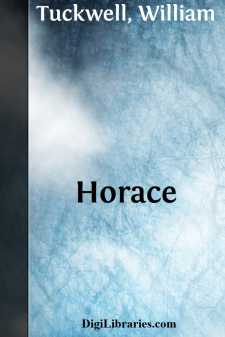Categories
- Antiques & Collectibles 13
- Architecture 36
- Art 48
- Bibles 22
- Biography & Autobiography 813
- Body, Mind & Spirit 142
- Business & Economics 28
- Children's Books 17
- Children's Fiction 14
- Computers 4
- Cooking 94
- Crafts & Hobbies 4
- Drama 346
- Education 46
- Family & Relationships 57
- Fiction 11829
- Games 19
- Gardening 17
- Health & Fitness 34
- History 1377
- House & Home 1
- Humor 147
- Juvenile Fiction 1873
- Juvenile Nonfiction 202
- Language Arts & Disciplines 88
- Law 16
- Literary Collections 686
- Literary Criticism 179
- Mathematics 13
- Medical 41
- Music 40
- Nature 179
- Non-Classifiable 1768
- Performing Arts 7
- Periodicals 1453
- Philosophy 64
- Photography 2
- Poetry 896
- Political Science 203
- Psychology 42
- Reference 154
- Religion 513
- Science 126
- Self-Help 84
- Social Science 81
- Sports & Recreation 34
- Study Aids 3
- Technology & Engineering 59
- Transportation 23
- Travel 463
- True Crime 29
Horace
by: William Tuckwell
Categories:
Description:
Excerpt
STRUGGLE
Quintus Horatius Flaccus, the "old popular Horace" of Tennyson, petted and loved, by Frenchmen and Englishmen especially, above all the poets of antiquity, was born on 8th December, B.C. 65. He calls himself in his poems by the three names indifferently, but to us he is known only by the affectionate diminutive of his second or gentile name, borne by his father, according to the fashion of the time, as slave to some member of the noble Horatian family. A slave the father unquestionably had been: meanness of origin was a taunt often levelled against his son, and encountered by him with magnanimous indifference; but long before Horace's birth the older Horatius had obtained his freedom, had gained sufficient money to retire from business, and to become owner of the small estate at Venusia on the borders of Apulia, where the poet was born and spent his childhood. He repeatedly alludes to this loved early home, speaks affectionately of its surrounding scenery, of the dashing river Aufidus, now Ofanto, of the neighbouring towns, Acherontia, Bantia, Forentum, discoverable in modern maps as Acerenza, Vanzi, Forenza, of the crystal Bandusian spring, at whose identity we can only guess. Here he tells us how, wandering in the forest when a child and falling asleep under the trees, he woke to find himself covered up by woodpigeons with leaves, and alludes to a prevailing rural belief that he was specially favoured by the gods. Long afterwards, too, when travelling across Italy with Maecenas, he records with delight his passing glimpse of the familiar wind-swept Apulian hills.
Of his father he speaks ever with deep respect. "Ashamed of him?" he says, "because he was a freedman? whatever moral virtue, whatever charm of character, is mine, that I owe to him. Poor man though he was, he would not send me to the village school frequented by peasant children, but carried me to Rome, that I might be educated with sons of knights and senators. He pinched himself to dress me well, himself attended me to all my lecture-rooms, preserved me pure and modest, fenced me from evil knowledge and from dangerous contact. Of such a sire how should I be ashamed? how say, as I have heard some say, that the fault of a man's low birth is Nature's, not his own? Why, were I to begin my life again, with permission from the gods to select my parents from the greatest of mankind, I would be content, and more than content, with those I had." The whole self-respect and nobleness of the man shines out in these generous lines. (Sat. I, vi, 89.)
Twice in his old age Horace alludes rather disparagingly to his schooldays in Rome: he was taught, he says, out of a translation from Homer by an inferior Latin writer (Ep. II, i, 62, 69), and his master, a retired soldier, one Orbilius, was "fond of the rod" (Ep. II, i, 71). I observe that the sympathies of Horatian editors and commentators, themselves mostly schoolmasters, are with Orbilius as a much enduring paedagogue rather than with his exasperated pupil....


